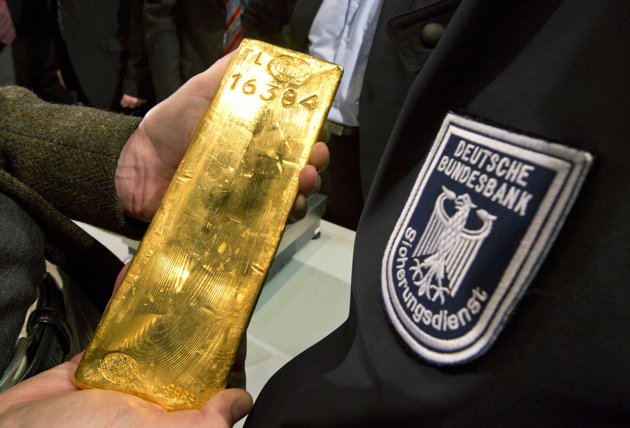By Michael Birnbaum, January 16, 2013 | The Washington Post

Germany’s gold reserves were scattered around the globe after World War II to prevent them from falling into the hands of the Soviet Union. Now much of the treasure trove will come home, the country’s central bank announced Wednesday.
After months of heated debate, stoked by fears about Europe’s economic crisis and criticism that the central bank was not keeping careful enough watch over its gold bars abroad, a top banker said Wednesday that his country would bring home $34.7 billion worth of shiny ingots.
The decision caps a discussion in which top German policymakers questioned whether they could believe the New York Federal Reserve’s promises that it had 122,597 bars of high-quality German bullion in its basement. Some German lawmakers had said they wanted to bring home the entire reserve, arguing that in a time of instability and fears over the future of Europe’s shared euro currency, keeping all the treasure locked up in German vaults would be prudent.
And with the fight over raising the debt ceiling heating up in Washington, more policymakers worldwide are confronting the possibility that the United States could default on its debts. German officials were quick to dismiss any connection with their decision.
Half of the holdings will now be squirreled away in Frankfurt, Germany’s financial capital. The rest will be divided between London and New York. Germany’s gold reserves are the second-largest in the world after those of the United States — but some Germans had started to question whether the metal on the books was actually backed up with the real substance.
“In Germany, a lot of emotion is attached to the topic of gold reserves,” Bundesbank board member Carl-Ludwig Thiele said at a Frankfurt news conference on Wednesday, Bloomberg News reported. “The Bundesbank has managed the gold reserves with great caution and will continue to do so.”
In a nation raised on the “Faust” legend, in which the devil convinces a ruler to abandon gold and print paper money instead, the whereabouts of the country’s gold have special resonance. A report last year from Germany’s chief auditor chided the central bank for failing to keep close enough track of the gold it holds abroad. The confidential report, details of which were quickly leaked to the domestic press, stunned Germans who routinely rate their central bank as one of the country’s most trusted institutions.
The gold trove is a source of pride to many Germans, although it no longer serves a monetary purpose, since the euro is not backed by gold (nor was the deutschmark before it). Proposals in recent years to sell portions of it to fund ambitious social schemes have been quickly dismissed. And the central bank president periodically takes German lawmakers into his own vaults to assure them that the country’s domestic stash is safe and sound.
Thiele said the German central bank planned to leave half of its gold parked abroad so that it would be available as collateral if Germany needed to buy large amounts of foreign cash on short notice — a step it would typically take only if its own currency was in crisis. Then he showed a crowd of reporters some bars of gold, along with the tools used to check their purity.
Bank analysts said the change would have little practical economic effect.
“It’s normal that you have most of your gold in your country,” said Joerg Kraemer, the chief economist of Commerzbank, who said his forecasts for Germany would change not one iota because of the decision. “This was bringing bad press for the Bundesbank.”
Gold-related headlines routinely streaked across Germany’s top-circulating Bild newspaper in the fall. “Is our gold still there at all?” read one in October. “Bring our gold back to Germany!” was another in November.
Wednesday’s announcement did not immediately satisfy some of the harshest critics of Germany’s gold practices.
The bank’s decision to bring the gold home is “only a symbolic reaction to the pressure” from the public, the parliament and the auditor, said Philipp Missfelder, the parliamentary foreign policy spokesman of the ruling Christian Democratic Union. “It’s not enough.”
Missfelder visited the New York Federal Reserve last year and asked to examine Germany’s gold. He said he was turned down. He has since called for German inspectors to be allowed in to ascertain the country’s gold holdings.
A spokesman for the New York Federal Reserve said it was institutional policy not to comment on individual account holders.
Germany plans to repatriate its gold over seven years, achieving its new targets by 2020, an acknowledgment that the logistics of shipping 674 metric tons of gold are extraordinarily complex. A spokesman for the German central bank declined to comment about how the bullion would be moved, citing security policies, but local media reported that previous shipments of gold had been sent from New York to Frankfurt via cargo plane.
Germany is just one of 17 countries that share the euro currency, and in the past year it has been outvoted on many of the most critical decisions. The German central bank is deeply wary of printing more money to help fund struggling euro-zone countries. But the European Central Bank voted to do just that, within limits, in late summer, over strident German opposition. The promise of unlimited backing was so strong that the euro crisis has significantly eased, even though no country has actually had to resort to the new safety net.
But German policymakers have been queasy ever since.
“The Germans kind of feel like they’ve been overrun in this decision-making process,” said Michael C. Burda, an economist at the Humboldt University of Berlin. Bringing the gold home, he said, “is just a signal that Germany is not going to take this much longer.”
Petra Krischok contributed to this report.



